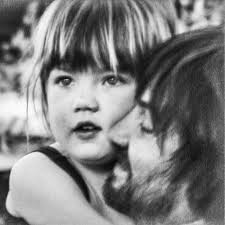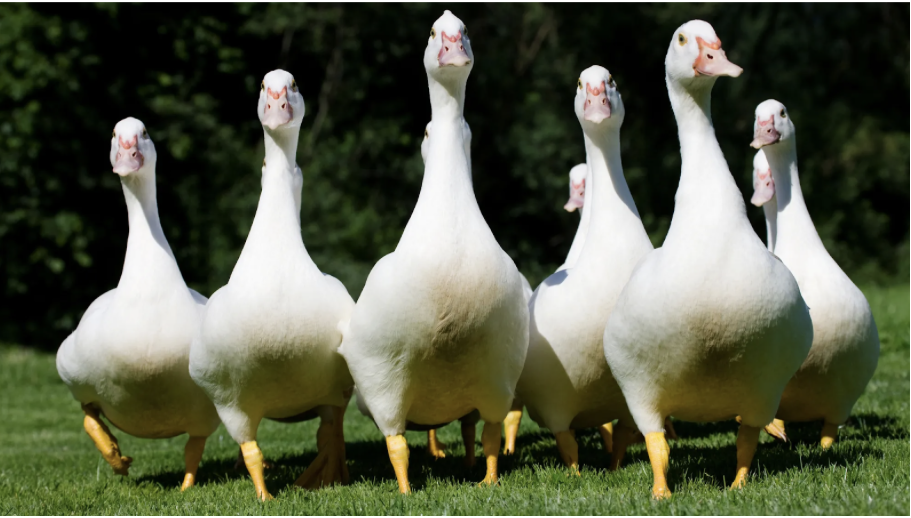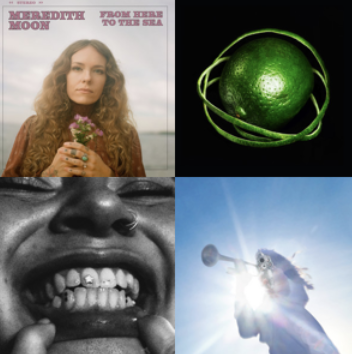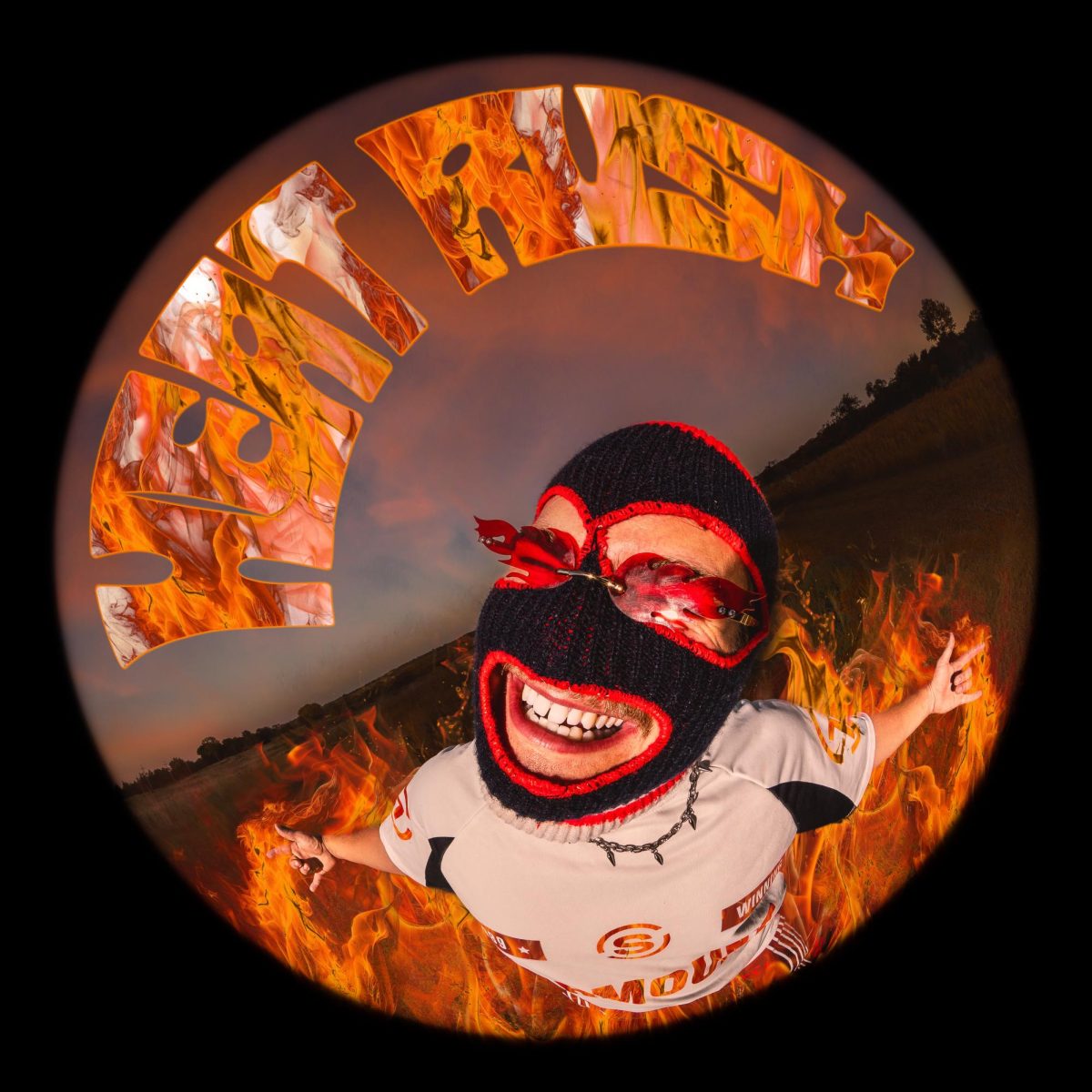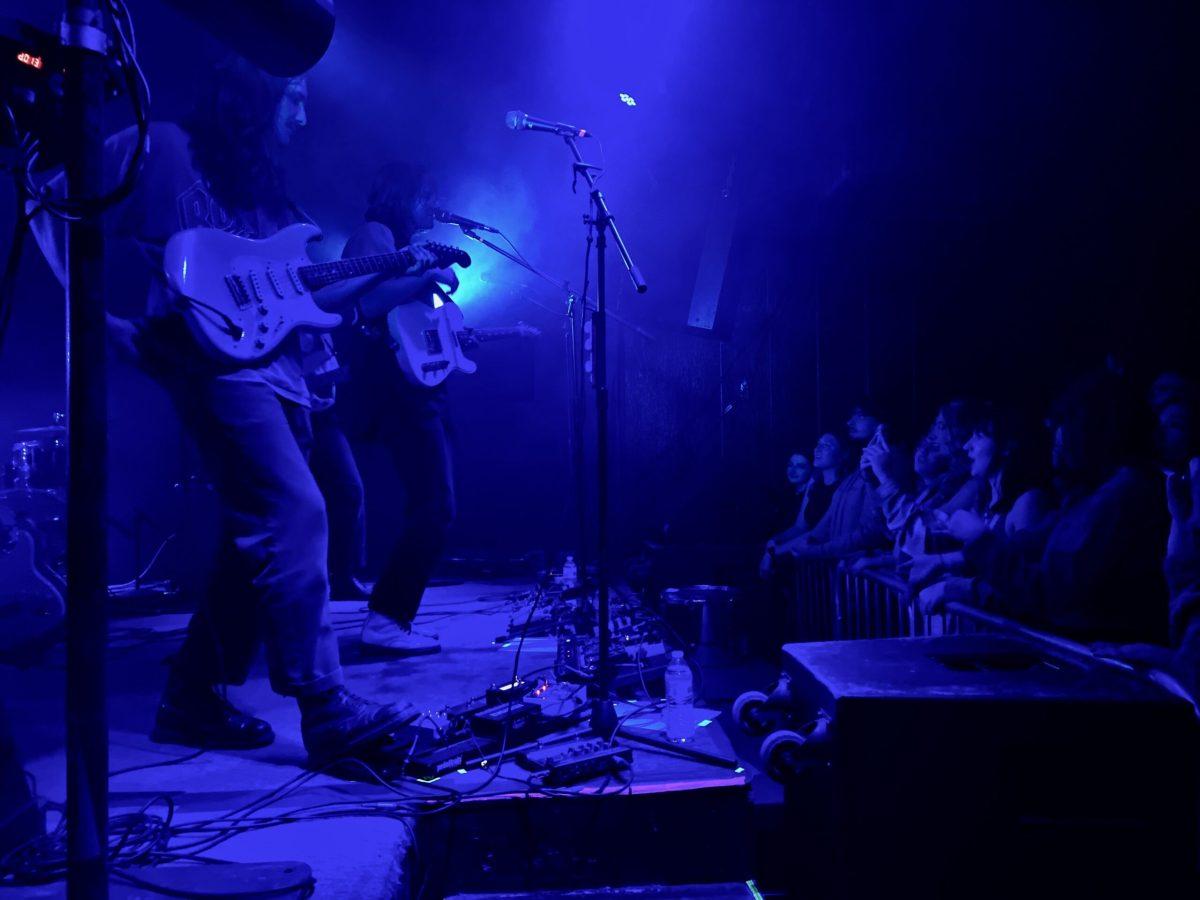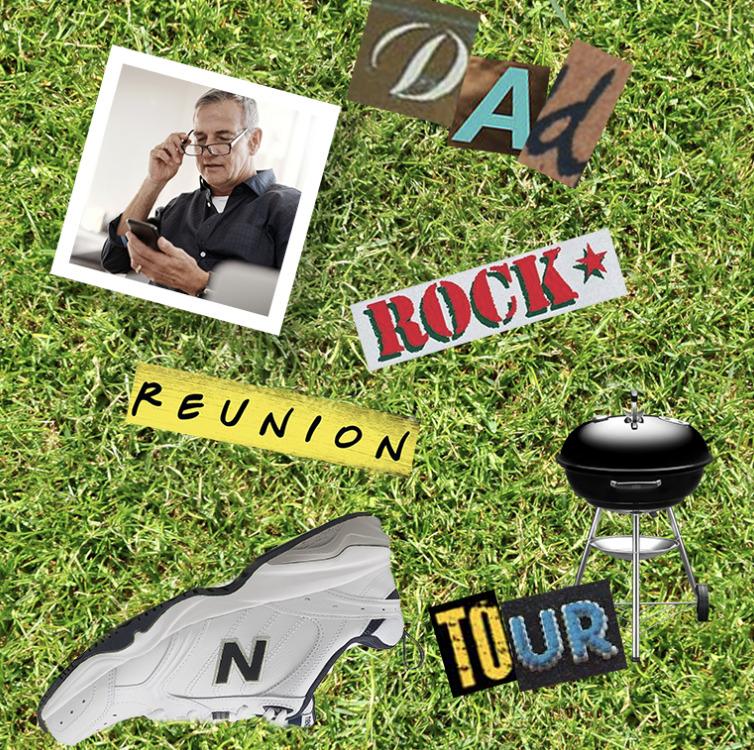Columbia basement rock band Laika blessed the airwaves on October 26th with a live set from KCOU’s very own Studio B. Shortly after this performance, Laika performed at Rose Music Hall on Halloween for KCOU’s 50th Birthday Bash and released their debut EP, White Cicada three days later. We aren’t sure if the performance or the EP were adding to the band’s energy, but from the loud crashing cymbals, the dancing bass stabs, and the ascendant wall of distorted guitar, the energy in the studio could only be described as lightning in a bottle.
At the time of the performance, Laika was gearing up to release their debut project, White Cicada. As an early KCOU birthday present, the band gave some insights into the EP’s creation process, their musical influences, and their writing process, as well as first listens to some of the new tracks. Here’s what Nate (guitar, vocals) had to say concerning the setlist.
Nate: We had a couple new songs. We have the EP coming out November 3rd. Six of the tracks that we played will be on that. And then we also played, two newer ones.
Interviewer: Like even more new than the EP? Wow, okay! This is like time traveling, in a way. So I was asking, I was wondering rather, where did the name “White Cicada” come from? Is there inspiration behind- because the album cover is very like based on that name, quite literally. Is there anything, like, a story behind that?
Intrinsic pressure comes with the naming of your debut project. For Rachel, guitarist and vocalist, the EP name found her.
Rachel: We were having like a really hard time deciding on EP names. And then I went to Pride and there was like a booth there that sold a bunch of books. And I got a bunch of white cicadas that are like pinned up. And that’s what the EP cover is. They have some beautiful glow on them. And then our friend, Sophie, took the album cover with like a bunch of random trinkets that all of us owned. So yeah, just came from some random pride booth. I wish I could remember the name though.
We here at KCOU formally endorse bug kids, those interested in the tiny ecosystems of the world. So upon hearing the project name, further information was required. We can’t say for sure why the conversation went where it did. Chaz and Matt responded to the question, “Were you a bug kid?”
Chaz: Oh, huge. I didn’t pick up bugs. But I remember in elementary school I used to, like read the bug books that were like available like in the library with like a couple of friends. We’d be like “This one looks so freaky!” Yeah, it was a good time.
Matt: I ate ants, as a kid.
Interviewer: You ate them?
Matt: Sometimes.
Chaz: I didn’t go that far.
Matt: If I was dared to eat an ant, I would eat an ant.
Interviewer: You’re just so hungry or?
Matt: No, it was more of like a performative thing, I think, really.
It’s easy to lump local bands into the same basket. For some artists, this could lead to feelings of resentment. However, for Laika, their local peers seem to be a welcomed influence that only elevates the band’s eclectic taste. Bassist Matt spoke on the sound of their new project, and where the band drew inspiration.
Matt: I would say it’s very like “Columbia.” I think like, more than anything, we’re influenced by a lot of like, more broad bands than genres. But like, I don’t know, I think we listen in a lot of the time and like, take influence from our friends and contemporaries, since I think that kind of shows in our sound, too.
Chaz: And what I think is interesting is that all of us have pretty, I mean, we listen to the same stuff, but I think going in terms of like, what influences us is very different. Like, my drumming– very influenced by the Beatles, Sonic Youth, REM, like those garage rock kind of simple sounds. While, Matt is really into jazz and Nate is really into kind of indie rock, like Alex G type stuff, you know. It’s it’s a wide range of different influences and sounds kind of colliding together. And I think that’s pretty cool.
With the wide range of musical influences and the overlap of some roles in the band, one may assume that translating these recordings to a live set could be a challenge. But, the band seems to thrive off of this collaboration and sees each show as an opportunity to impress their audience.
Nate: I think all of us are just like, we enjoy performing so much that, we’re so grateful to be able to be on the stage that I don’t know, if you mess up, you’re still getting the play on stage in front of people. How mad can you be?… I love talking to everyone after the shows anyone that comes up and wants to talk about the music we just played or music they’re making or they’re listening to. I think that’s priceless, in my opinion. It shows that our music has touched people.
Laika brandishes a loud, bold sound during their live sets. Just from watching them play, the audience gets the sense that these songs have been repped countless times. Seeing each member’s contribution, it’s no surprise that the songwriting process itself is a collaborative effort.
Matt: I think it’s kind of piecemeal, like in terms of like lyrics, and like main melodies and stuff, I think Nate or Rachel often just kind of come with those ideas already, at least somewhat, pre-developed. And then it’s really kind of a holistic process of us listening to it, thinking of what fits in, and really just kind of looping it, and like finding our little sound. And then focusing on that and going bit by bit until we kind of have a more complete thing. I think. I don’t know if that’s accurate to you guys. But that’s how I take it.
Nate: Yeah, I’d say that’s true. I know, at least for “Bluff” I had like, written portion of the song. And I just sent it off to Julian and was like, kind of gave him the direction of what I was thinking. And then it was just in his hands to kind of fill in both stuff that the song he did from there, and it just gets passed on to the next person.
Julian: Yeah, and what was filled in is just an arpeggio, like, I believe major 7th going up with the chords.Influenced pretty heavily by Beach House, because they have that. I think it was on “Space Song.”
Starting a band from the ground up can be daunting. However, for Laika, that feeling of self-doubt seems to subside the more they play on stage. Nate, Matt, and Chaz had these pieces of advice for those who are looking to start making music.
Nate: I would say, if you’re trying to start a band: your house, your friend’s house, backyard- just play. Because I feel like there’s some level, if someone sees people playing instruments live, they’re gonna like it, to some degree or they’re at least going to be interested. Yeah, play live shows.
Matt: I think it’s also important to note that, like, if you make music, then you are, by definition, a musician. And I think a lot of people when they’re starting out, especially with the younger, tend not to view themselves like that until they reach a certain point of, like, skill where they feel confident in their ability, but that kind of deprives you of some of the most enriching times: when you feel kind of out of your depth with like other people. And I always think that if I’m the worst musician in the room that I’m getting better like, the fastest in the room as well. So just like putting yourself out there and not being afraid to sound bad, you know, at least in your own head, I think really frees up your progress for sure.
Chaz: And on the point of like, playing music to your ability, like Bob Dylan, and like, Daniel Johnson are terrible singers, but people love them because of the passion behind the music and lyrical content, whether it be you know, vibes or whatnot.’
And while collaboration and teamwork is most definitely the core of Laika’s chemistry, sometimes the process winds down to a band member workshopping ideas alone, like Nate and Rachael writing lyrics or Julian crafting a guitar accompaniment for a demo.
Nate: I mean, when I’m writing lyrics, I don’t- I have like this whole theory of like, it’s not really the words themselves matter, it has to do more with like, the, syllables at certain points that kind of stick out to people and maybe singular words at certain points of the song, like convey a certain emotion. So I feel- I don’t know. I don’t think people should have to deep into the meaning of songs- as to what they think I’m saying, and maybe focus more on what they from it and what they’re feeling from it.
Interviewer: Are lyrics like a collaborative thing, or is that just the two, like, singer-songwriters? Or is it like, “here’s the lyrics I have” to the band?
Matt: It seems more localized, I think who’s singing the song. Yeah, I imagine feedback is always welcome. But it seems like we’re all pretty- like we all admire both of their abilities to write great songs. So we trust that.
Chaz: I actually have a song that I’ll be singing on in the near future that we were working on.
Interviewer: Woah!
Chaz: Yeah, you know the whole joke *in Ringo Starr’s voice* “Oh, the drummer, he’s got a song!”
Rachel: Is that the bit?
Chaz: Yeah, it’s like Ringo coming in with a song for the Beatles and it’s like “Oh, dear.”,
Rachel: I’m gonna do that every time you sing it.
For those looking to start a band, take advice from Laika. Whether you’re starting to jam with some friends or classmates, or going to local gigs to find like-minded people, the most important part is to just start playing, and never stop. Sounds easy enough.
Listen to the full set and interview below!

